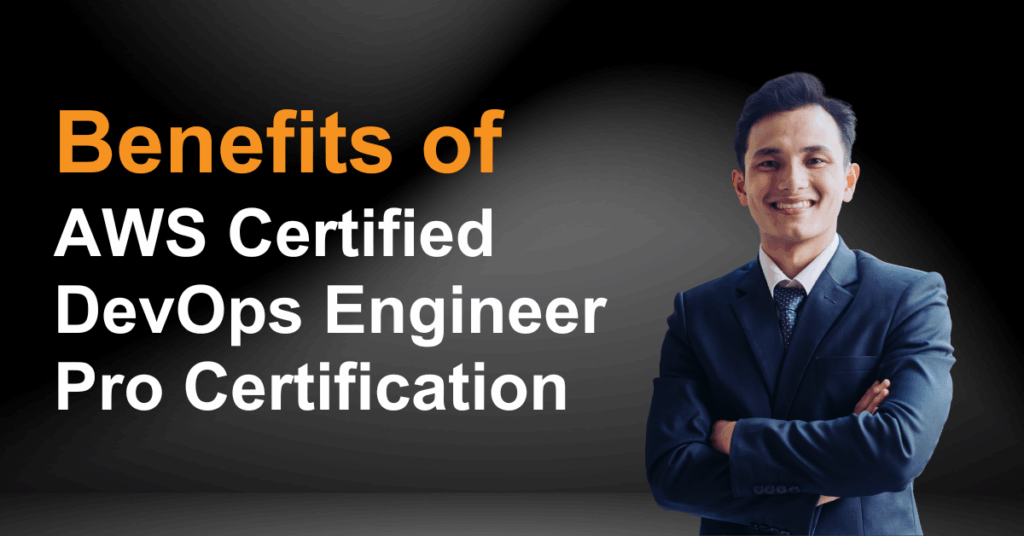Benefits of AWS Certified DevOps Engineer Pro Cert

The AWS Certified DevOps Engineer – Professional certification is one of the most prestigious recognitions for cloud engineers looking to master automation, continuous deployment, and large-scale cloud operation. It confirms how proficient you are in operating sophisticated AWS environments with high availability and security.
As a cloud engineer, developer, or even an architect, having this certificate can go a long way and unlock senior positions in DevOps and Cloud Architecture for you. Let’s explore the top benefits of achieving this certification.
Table of Contents
Top 7 Benefits of AWS Certified DevOps Engineer Pro Cert
1.Career Advancement and Global Recognition
AWS Certified DevOps Engineer – Professional certification is widely recognized as a benchmark of technical skill and acumen in cloud automation. It shows that you can manage CI/CD pipelines, deployment strategies, and security configurations – extremely valuable skills in high demand by the most successful employers.
As AWS dominates the market share, having this certification raises your professional status and differentiates you from other job candidates. This also prepares you for jobs as a:
- DevOps Engineer
- Site Reliability Engineer (SRE)
- Cloud Infrastructure Architect
- Automation Specialist
2.Higher Earning Potential
AWS-certified professionals always rank among the highest paid in IT. Based on Global 2019 Salary Surveys, a professional DevOps Engineer Professional can earn an average of $130K-$160K per year , depending on experience and region.
This certification confirms your ability to apply automation, monitoring, and scaling solutions used to create and manage an optimal cloud architecture. In short, this is a credential that can help you negotiate higher pay and better benefits.
3.Deep Technical Expertise
Unlike associate-level certifications, this professional exam requires a strong understanding of DevOps principles and AWS services, such as:
- AWS CloudFormation
- AWS CodePipeline and CodeDeploy
- Elastic Beanstalk
- CloudWatch and Systems Manager
- Security automation and monitoring
Preparing for this certification helps you master infrastructure automation and operational excellence on AWS. You’ll learn how to integrate monitoring tools, automate deployments, and design fault-tolerant systems — skills that make you invaluable to any DevOps team.
4.Real-World Problem-Solving Skills
Hands down, one of the best things about this certification is the hands-on learning. AWS focuses on solutions to real-life problems with situation-based queries.
You’ll be able to create end-to-end automation pipelines, diagnose performance issues, and deploy secure, scalable applications. This day-to-day knowledge will allow you to become better at everything DevOps, making yourself more productive and reliable.
5.Strong Industry Demand
Today, DevOps represents the bedrock of contemporary cloud operations, and businesses increasingly depend on AWS specialists to operate automation and delivery. The AWS Certified DevOps Engineer – Professional certification proves you can facilitate the practice of developmental operations and lead organizational success by delivering applications and services at high velocity.
As more companies move to the cloud at an increasingly rapid rate, , professionals with certifications are sought after , especially in fields liike Fintech, health care, E-commerce and cybersecurity. Getting certified will prepare you for digital transformation and make you a valuable asset to any enterprise.
6.Continuous Learning and AWS Ecosystem Growth
More than badges, AWS certifications signify a commitment to continuous learning. To study for the DevOps Engineer Professional exam, it’s important to research new AWS tools, best practices and how it implements automation.
This continuous interaction enables you to keep current with AWS innovations such as serverless computing, AI/ML-based monitoring and infrastructure as code (IaC). As AWS changes over time, you’re well-situated to adapt and invent new in the tech world.
7.Networking and Community Benefits
Join a worldwide network of cloud professionals, mentors, and employers with an AWS Certification. You will have access to AWS’ exclusive events, digital badges and programs that provide you with trend insights.
Connecting with others in the AWS community may result in career opportunities, job referrals, projects, etc to take your professional journey to the next level.
Conclusion
The AWS Certified DevOps Engineer – Professional certification is more than a credential — it’s a career accelerator. It validates your technical expertise, enhances your earning potential, and gives you a competitive edge in the rapidly growing cloud industry.
Prepare smarter with Certify360’s AWS Certified DevOps Engineer Professional course — designed to help you master automation, CI/CD pipelines, monitoring, and AWS infrastructure management through real-world labs and AI-driven mock exams.
FAQs
Q1. Is AWS Certified DevOps Engineer Professional Certification worth it?
Yes, it’s highly valuable for professionals aiming to advance in cloud automation, CI/CD, and scalable infrastructure management roles.
Q2. How long does it take to prepare for AWS Certified DevOps Engineer Professional Certification?
Most learners spend 3–4 months preparing, balancing theory, AWS labs, and practice exams to ensure hands-on proficiency and exam readiness.
Q3. What are the prerequisites for AWS Certified DevOps Engineer Professional Certification?
You should have prior AWS experience and ideally hold the Solutions Architect or Developer Associate certification before attempting this exam.
Q4. What kind of job roles require AWS Certified DevOps Engineer Professional Certification?
This certification suits DevOps Engineers, Cloud Architects, Automation Specialists, and professionals managing large-scale AWS deployments across organizations.
Q5. How does AWS Certified DevOps Engineer Professional Certification impact salary potential?
Certified professionals often earn higher salaries, with pay increases averaging 20–30% compared to non-certified peers in similar roles.
